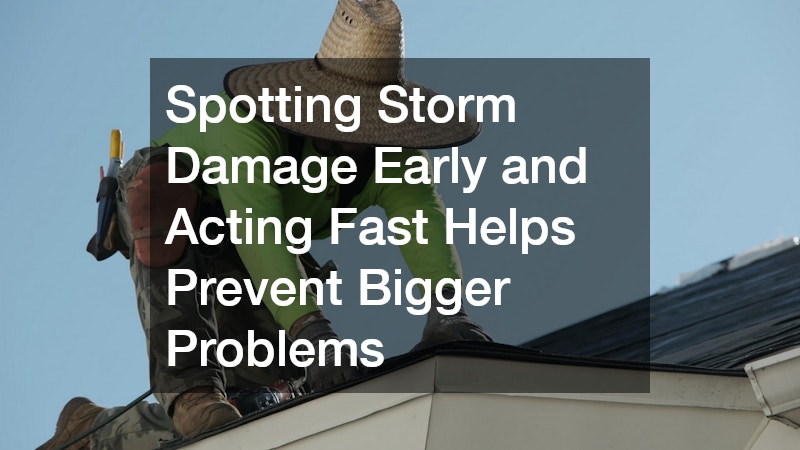
Storm Damage? When to Call a Roofing Contractor
Storm damage can severely affect your home, especially the roof, which is the first line of defense against harsh weather conditions. Knowing when to consult a roofing contractor can save you from costly repairs and further damage to your property.
While some minor damages might seem manageable, serious storms can cause issues that necessitate professional intervention. Recognizing the signs of significant damage early on means you can address them before they escalate into larger problems.
This guide aims to offer insights on assessing roof damage, understanding repair costs, and selecting the right professional help when needed.
How to Assess Roof Damage After a Storm
Visible Signs of Damage
After a storm, it’s crucial to check for visible signs of roof damage like missing shingles or dents, which indicate potential vulnerabilities. Water stains on your ceiling or attic spaces are indicators of leaks and should be addressed promptly.
Granules from asphalt shingles in your gutters can also signal wear. These granules protect your roof, and their absence can reduce your roof’s lifespan significantly.
If left unattended, these visible signs can lead to more extensive roof damage, thus necessitating the involvement of a roofing contractor. Ignoring these could mean water seepage, leading to structural and foundational issues in your home.
Tools and Techniques for Inspection
Inspecting roof damage can often be dangerous without the right tools and knowledge. Using binoculars to check your roof from the ground is a safe technique that allows you to examine for distress without risking personal injury.
For a closer look, a ladder and a harness are essential when inspecting the roof directly. It’s important to have someone with you who can hold the ladder steady and provide assistance if needed.
In some cases, utilizing drones equipped with cameras can provide a comprehensive overview of the roof’s condition without compromising safety. These technologies allow for a detailed inspection and can highlight areas needing urgent attention.
What are the Costs Associated with Storm Damage Repairs?
Factors Influencing Repair Costs
Repair costs can vary widely based on several factors, including the extent of the damage. More significant damages typically result in a higher number of repairs.
The type of roofing material also plays a role—the cost of repairing asphalt shingles may differ from metal or tile roofing due to material-specific considerations. Labor costs, determined by geographic location and contractor experience, also contribute to the overall expense.
Economies of scale might apply if multiple homes in an area are damaged, potentially leading to discounts or increased charges depending on demand. Therefore, soliciting quotes and timing your repair can impact the overall financial outlay.
Understanding Insurance Claims
Filing an insurance claim for roof damage requires knowledge of your policy’s coverage. Most homeowners’ insurance policies cover storm-related damages, but coverage specifics can vary significantly.
It’s crucial to document all damage thoroughly with photos and written notes before contacting your insurer. An early claim can expedite the repair process, partly offsetting personal expenses.
Some policies require prompt notification of damages, and delays in filing can affect your claim outcome. Having a trusted contractor perform an initial assessment can also help in providing accurate information to support your claim.
How to Choose a Reliable Roofing Contractor
Qualities of a Good Roofing Contractor
Choosing the right contractor begins with checking credentials like licenses and certifications, which ensure they meet local industry standards. A reputable contractor will have a portfolio of previous work and verified client testimonials.
Another quality to look for is responsiveness; a contractor who promptly returns calls and is willing to discuss concerns is likely to be more reliable. Integrity in business practices, such as transparent pricing and clear contracts, is also crucial.
Experience in installing and repairing different types of roofing adds to a contractor’s reliability. Knowing they can handle various roofing materials and complexities reassures you that they are prepared for your specific needs.
Questions to Ask Before Hiring
Before hiring a contractor, inquire about their insurance and bonding status to protect yourself from liabilities should an accident occur during repairs. Ask for an estimated time frame to complete the repairs to ensure a mutual understanding of project timelines.
Inquiring about warranties offered on both materials and work guarantees the long-term quality of the repair. A contractor’s willingness to provide a detailed written estimate can also help you avoid unexpected costs.
Ultimately, it’s wise to ask for references from recent customers to gain insight into their satisfaction levels. Checking past customer experiences can provide a comprehensive picture of a contractor’s reliability and quality of work.
Recognizing storm damage signs and acting promptly can prevent minor issues from becoming significant problems. Evaluating damage accurately and understanding repair costs ensures informed decisions are made.
Choosing a qualified roofing contractor with credibility and transparency is key to seamless repair experiences. When in doubt, always seek professional advice to protect your home effectively.


